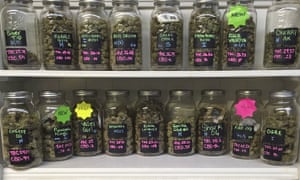I have been posting on Marijuana for a decade now. I am not a user, but I have always understood that criminalization alone created the present vibrant black market. Before then it was literally unavailable except for a handful of dedicated users and the status quo was unlikely to change much.
The long-term will see all criminalization efforts end on all drugs. Regulation has succeeded for alcohol and tobacco and will do as well with all the rest.
Canada is well positioned to lead the changeover and they are proceeding carefully to do so. As you might expect laws are been changed and provinces who must manage the new laws are all engaged. This is really good news.
They are also paying attention to transitioning much of the black market into the industry itself as much as practical. Since the majority of these folks were harmless, this makes good sense.
Canda has also led in blocking advertising of tobacco and to some degree of alcohol. This needs to also be applied. I would add encouraging quality suppliers has worked out well for us in alcohol. It has driven a craft beer industry and a true wine industry. The same should also emerge for marijuana.
All eyes on Canada as first G7 nation prepares to make marijuana legal
From crime to health to business, Canada’s decision to legalize marijuana is a grand progressive experiment that promises to answer a host of questions
Selena Ross in Montreal
Wed 6 Jun 2018 07.00 BST
Marijuana legalization could affect Canada’s crime patterns, health and countless other factors. Photograph: Bernard Weil/Toronto Star via Getty Images
https://www.theguardian.com/world/2018/jun/06/all-eyes-on-canada-as-first-g7-nation-prepares-to-make-marijuana-legal
When Canopy Growth opened its first cannabis factory in an old chocolate plant near Ottawa four years ago, it did so predicting a bright future. Canadahad already legalized medical marijuana, and Canopy predicted full legalization for recreational use to be next.
What the company hadn’t predicted, however, was the sudden flood of foreign visitors. Politicians and police authorities from Jamaica, Germany, Denmark, the Netherlands, Greece and Australia have all come knocking, as well as doctors from New Zealand, Brazil and Chile, along with groups of corporate investors and bankers – so many that Canopy now sometimes splits up the groups according to their birthdays.
“We knew we’d have to give a lot of tours, so we just cut a window into the wall,” said the company spokesman, Jordan Sinclair. “We put windows in all of the doors.”

Canada will be thrust even more directly under the international microscope on Thursday, when a vote in the Senate is expected to ratify Bill C-45, effectively making Canada the first G20 nation to legalize recreational marijuana.
“It’s going to be a bit of a science fiction experience for a while,” said Benedikt Fischer, an expert on substance use at Toronto’s biggest psychiatric hospital. “It’s unique in the world, because it’s happening for the first time in a wealthy country. It’s not like in the US, where there are these state experiments. Most people kind of ignore Uruguay. And so the world is really looking at this.”
Governments, researchers and business leaders around the world all have their own reasons for keeping tabs. Legalization could affect Canada’s crime patterns, health and countless other factors – but exactly how, no one yet knows.
Each Canadian province plans to roll out its newly legalized market in a slightly different way, creating about a dozen mini-laboratories within one massive test case.
Even places that have already taken the legalization plunge are hoping Canada will solve some mysteries. After Colorado legalized marijuana five years ago, for example, organized crime reacted by ramping up supplies of “black tar heroin, opiates and harder drugs”, said Dr Larry Wolk, the state’s top public health official.
But Wolk says he is interested to watch that process unfold on a bigger scale in Canada, where the new law is expected to deal a much more significant blow to the black market. Any new mix of illicit drugs in the country could have new effects on public health.
“What’s the impact of marijuana legalization on the opioid crisis?” he asked as an example. “Does it actually act as a substitute so that people can get off opiates for chronic pain? Is there a positive impact? Or is it a negative impact, because as a result there’s more opiates in the black market? Is [pot] a gateway? We don’t really have an answer.”
One delicate balance for Canadian authorities has been guessing at what kind of pricing will be low enough to eradicate illicit sales – yet not so low as to entice new users. Canada’s finance minister, Bill Morneau, recently said the goal is “keeping cannabis out of the hands of kids and out of the black market. That means keeping the taxes low so we can actually get rid of the criminals in the system”.
One sign of success will be if Canada not only discourages underground sales, but converts illicit sellers to the new system, said Tim Boekhout van Solinge, a Dutch criminologist.
“What I am mainly following … is who will be the new legal growers, and whether authorities manage to get some of the illegal growers to become legal growers,” he said.
FacebookTwitterPinterest Legal marijuana for sale at a shop in Salem, Oregon. Photograph: Andrew Selsky/AP
Each country around the world that has debated whether to relax cannabis laws has had its own priority in mind: from generating revenue to discouraging drug cartels. In Canada, the emphasis has been largely on public health. Cannabis will be sold in fairly plain packaging, and usually through government-run boards that already control liquor sales.
“It won’t be like buying Budweiser or branded alcoholic products,” said Steve Rolles of Transform, a UK drug policy thinktank. “It’s going to be more like buying pharmaceuticals from a chemist.”
Still, it’s hard to know whether Canada, or any similar western country, will be able to stick to that public-health focus, he said.
“We have concerns … that the lessons from alcohol and tobacco wouldn’t be learned, and we might see overcommercialized markets in which profit-making entities would seek to encourage more use and could encourage risky consumption behaviours,” he said.
So far, Canada has allowed a few major players to dominate the industry, and their influence remains to be seen, said US marijuana industry expert Mark Kleiman.
“You don’t want to build up big vested interests that then resist any change,” he said. “If you have commercial industry in cannabis, they’re going to end up writing the laws.”
For epidemiologists, Canada will provide the best-ever data sets on cannabis use.
Colorado’s health results have been encouraging, said Wolk. But overall, researchers lack solid data about cannabis use. Some key questions include addiction levels, how cannabis affects mental health, and effects on young people, said Israeli scientist Raphael Mechoulam, often called the “grandfather” of cannabis research.

“About 10% of the users may be addicted – less than alcohol or tobacco,” he said. “Some users, who are already prone to schizophrenia, may get the disease earlier.” He said he is also keeping an eye on whether heavy use by young people may affect their central nervous system.
Another current Canadian health debate is how many people will be light, casual cannabis users, and how many will be heavy users.
The government still must decide how to approach products that are “very potent” in THC, the psychoactive compound in cannabis, said Mark Ware, a drug researcher and pain specialist who helped lead Canada’s federal taskforce advising the new legislation. Black-market sellers have produced increasingly strong concentrates, he said.
“Those have not been the subject of studies up until recently, so the question of whether to regulate those, allow them in whatever context, and then be able to study their impacts on health, that would be very important,” he said. But “once they’re out there, it’s very hard to put them back in the box again”.
Canadian police, meanwhile, will grapple with how to crack down on cannabis-impaired driving. That’s already a struggle around the world, regardless of marijuana’s legality, said Rolles. But it’s much more difficult to measure impairment from cannabis than from alcohol, and enforcing a legal limit will prove tricky.
Meanwhile, many investors have already made huge profits from cannabis stocks, and a big question for them is whether the bubble bursts – or the value keeps rising.
“They’re waiting to see if the sky’s going to fall,” said Sinclair of Canopy. One of about 100 Canadian legal producers of medical cannabis, the company owns a third of the medical market, began trading on the Toronto stock exchange in 2016 and last month became the only cannabis producer on the New York stock exchange.
“[Investors] are waiting to see if all the stigma and all the demonization of this product that’s built up in 90 years of prohibition is true,” Sinclair said. “It’s on us to demonstrate that it’s not.”


No comments:
Post a Comment